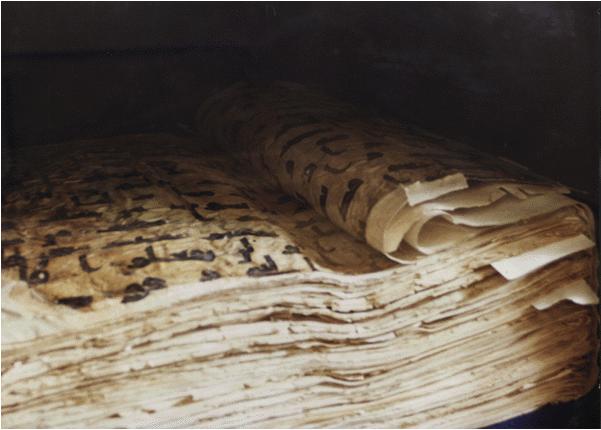
“Islamic civilization... is a civilization of jurisprudence,” says al-Jābrī [1]. However, Ayatollah Muḥammad ‘Alī al-Ṭabāṭabā’ī was perhaps more accurate when he said: “Islamic civilization is the civilization of the text, and at its head the text of the Noble Qur’ān”[2]. However, the epistemological authority of the religious text did not leave the Arab-Islamic mind any margin for freedom of thought outside the scope of commentary and interpretation of the ‘foundational text’.
BY SAID NACHID
IT IS MOST likely that the moment when the codification of the Qur’ān took place represents the pattern of epistemological and active isnād (chain of authority) in the Islamic mind, as opposed to what al-Jābrī and before him Ahmed Amin termed the ‘codification era’, which is to have occurred sometime between the middle of the second and the middle of the third century AH. The history of Islamic culture is nothing but the history of commentaries, interpretations, and explanations that have been floating about, purposefully or not, around a ‘foundational text’ that was, and still is, demonstrating this epistemological isnād system, and thus represents the bounds of the rational view and the reins of legal ijtihād.
In the end, after exhausting all possibilities of commentary and interpretation at the beginning of the modern era, it is only natural that Islamic history has stopped its movement, and become sterile and idle. While Muḥammad ‘Ābid al-Jābrī, Naṣr Ḥāmid Abū Zayd, Abū Ya‘rib al-Marzūqī, Muḥammad Shaḥrūr, and many others, hold that the battle for the interpretation of the religious text remains open to the possibilities of being resumed, and open even for rational and secular forces to delve into it and comment on it, I think otherwise. I prefer to propose alternative working hypotheses.
So what do I suggest?
With all honesty and impartiality, for all this long history of attempts to interpret a Qur’ānic discourse, Muslims made it a text and then made this a closed text, and even an absolute authority. Finally, it must be recognized that the Holy Qur’ān has exhausted all possibilities of interpretation for modernizing it and revitalizing it, and we can no longer add a new interpretation, whether by adopting the mechanisms of bāṭinī (esoteric) interpretation (the esoteric sects), or ẓāhirī (apparent) interpretation (Ibn Ḥazm), or ishhādī (testamentary) interpretation (Ibn ‘Arabī), or rhetorical interpretation (al-Zamakhsharī), or philosophical interpretation (Fakhr al-Dīn al-Rāzī), or the interpretation of the Qur’ān by the Qur’ān (Muḥammad Ḥusayn al-Ṭabāṭabā’ī), or social interpretation (Muḥammad ‘Abduh), or ḥarakī (revolutionary activist) interpretation (Muḥammad Ḥusayn Faḍlallāh), or idiomatic interpretation (Muḥammad Shaḥrūr), or many others of this ilk.
It must be recognized that the Holy Qur’ān has exhausted all possibilities of interpretation for modernizing it and revitalizing it
Whatever the available and possible aspects, it seems that the strings of interpretation have reached their maximum potential to stretch and extend, and no longer allow us to make any further steps towards the world of political modernity, individual freedoms, and human rights. Indicative of this is how today we are unable to conceive of any legal or egalitarian interpretation of the verse:
The male shall have the equal of the portion of two females [Qur’ān IV – al-Nisā’ – 11]
– unless it be justified by the circumstances of the Revelation of the verse, in view of the existing social and economic situation at the time of the Messenger, as is done variously by Abū Ya‘rib al-Marzūqī, Muḥammad ‘Ābid al-Jābrī, and Muḥammad Shaḥrūr, so as to remove the embarrassment caused by the ruling of the verse.
But with this justificatory logic we are simply seeking excuses and mitigating circumstances for Qur’ānic rulings that appear unjust according to the standards of contemporary moral conscience. Rather, it open up the wound that Raja ben Salama termed “the wound of divine preference” [3], a wound that no new interpretation can heal, except by resorting to playing with the meanings of words, which may assuage but does not convince.
We have to face the question: what is the fate of the relationship between us, Muslims of the twenty-first century, and the ‘Qur’ānic text’? The Holy Qur’ān is a text that we chant and recite in our prayers and use for worship. This is what we have been doing for fourteen centuries. This does not raise any religious or political problems. But when we grant it the character of a divine constitution, all we are doing is restricting our opinions and political stances to concepts and perceptions that belong to antiquity.
We are simply seeking excuses and mitigating circumstances for Qur’ānic rulings that appear unjust
Perhaps the fanaticism shown by some Muslims about political (and particularly pre-political) concepts contained in the Qur’ānic text is nothing more than a cover-up for the difficulties we have in digesting rulings of a text that we have ‘sacralised’, even if it did fit the psychological, social and linguistic levels of the individual in the ancient world. We don’t have a technique for reviving its rulings other than by circumventing them or suspending some or most of them. Pragmatic-minded Islamists then remain silent about this circumvention or call it a temporary suspension, pending the realization of the utopia of the Muslim community at some unknown future date, as the mouthpieces of most Islamists today put it.
However, such a guiding and salvific output fails to mitigate any embarrassment so long as we consider the text to constitute divine commandments with absolute legislative authority for all times and all places. So it is that within the arena of the Qur’ānic text the rationalists are usually defeated by the textualists by a large margin. Even the proponents of ijtihādī textualism are defeated by letter-by-letter textualists. If everyone at least decided to neutralize the text from political controversy, this would be a practical option, but it would still to be buttressed by ijtihād.

Suggested Reading
Strictly speaking, our problem with the Holy Qur’ān is that we no longer live in a time of slaves, booty, jizya tax, and ‘what your right hands possess’ [4], we no longer live in a time of ‘those who blow on knots’ [5] and the manumission of slaves[6] and the marriage or divorce of ‘those who have not had their courses‘ [7] and so on. So confronted by most of the provisions, concepts and perceptions of the Qur’ān, we feel some kind of embarrassment and confusion. We see how the ‘sacred text’ is alien to the modern world. And sometimes we twist the language around against the rules of Arabic grammar, as some do. On the other hand, extremists appear to be the honest ones, believing the explicit literal text that they have in their hands.
In the face of this situation, the ‘moderates’ find no opportunity to mitigate their embarrassment except by claiming that those rulings that speak to a Bedouin society from the ancient world are in need of an ijtihād that remains open to a horizons unforeseen. Or, alternatively, they simply keep silent.
…
Over the following essays, we shall enumerate five alternative hypothesis for what the Qur’ānic text actually is.
[1] Muhammad Abed Al-Jabri, تكوين العقل العربي (‘The Formation of the Arab Mind‘), Dar Al-Tali’ah, Beirut, first edition 1984, pg.: 96.
[2] Ayatollah Muhammad Ali Al-Tabatabai, Al-Baṣā’ir Magazine, Beirut, Issue 22, Winter 97, p.: 127.
[3] Raja Ben Salama, جرح التفضيل الإلهي, Al-Awan website, March 01, 2007.
[4] مَا مَلَكَتْ أَيْمَانُكُمْ Qur’ān IV (al-Nisā’), 36: “(Be good to the slaves) whom your right hands possess”.
[5] النفاثات في العقد Qur’ān CXIII (al-Falaq), 4: “(Say: I seek refuge in the Lord of the dawn) from those who blow on knots” (i.e. those who perform malignant witchcraft).
[6] فَكُّ رَقَبَةٍ Qur’ān XC (al-Balad), 13.
[7] وَاللَّائِي لَمْ يَحِضْنَ Qur’ān LXV (al-Ṭalāq) 4: “And (as for) those of your women who have despaired of menstruation, if you have a doubt, their prescribed time shall be three months, and of those too who have not had their courses”.


